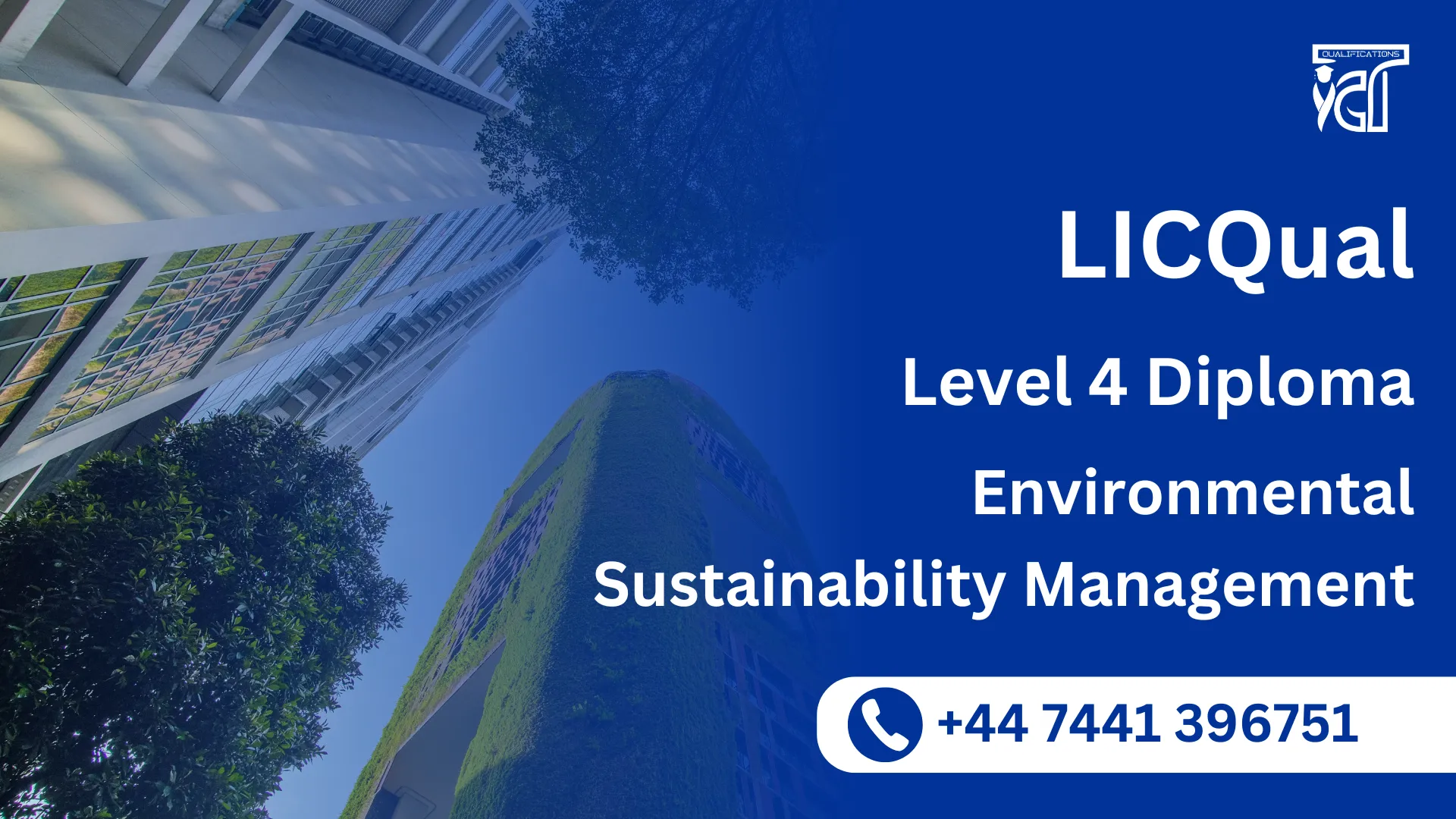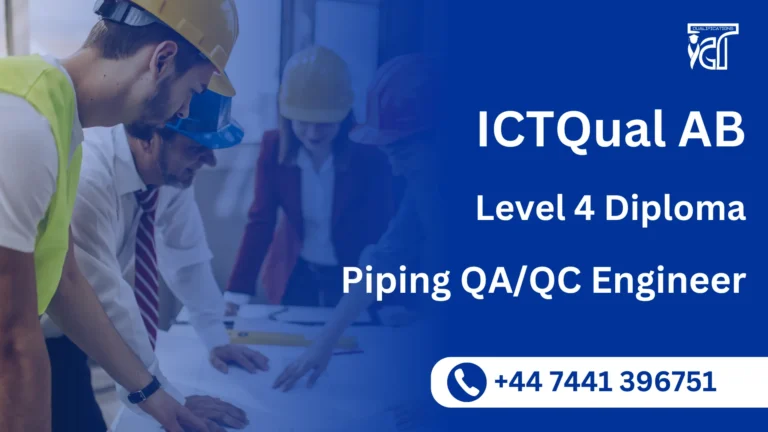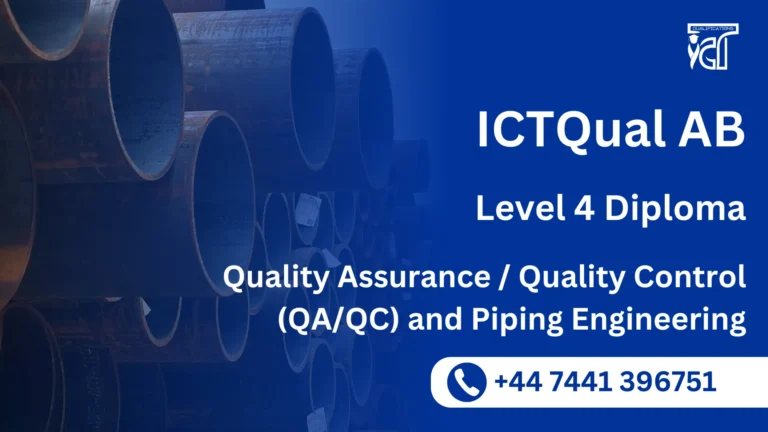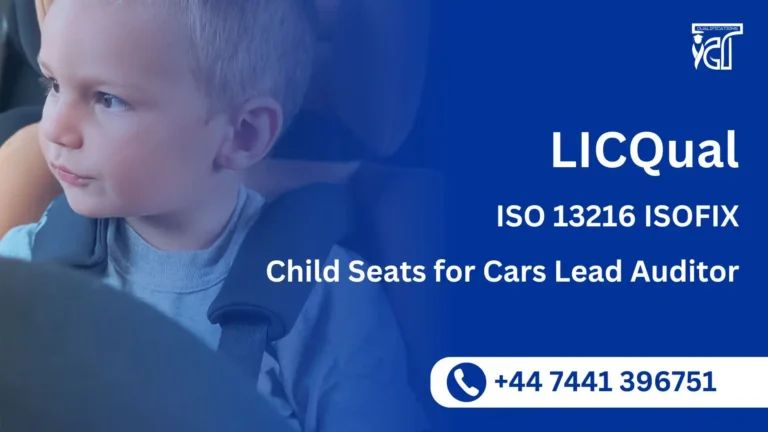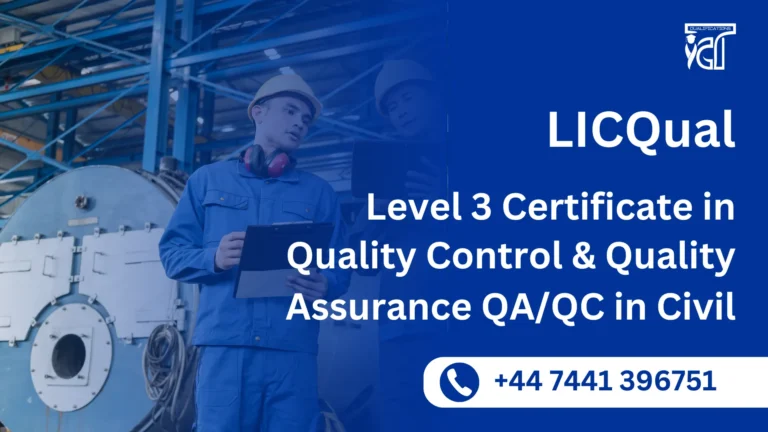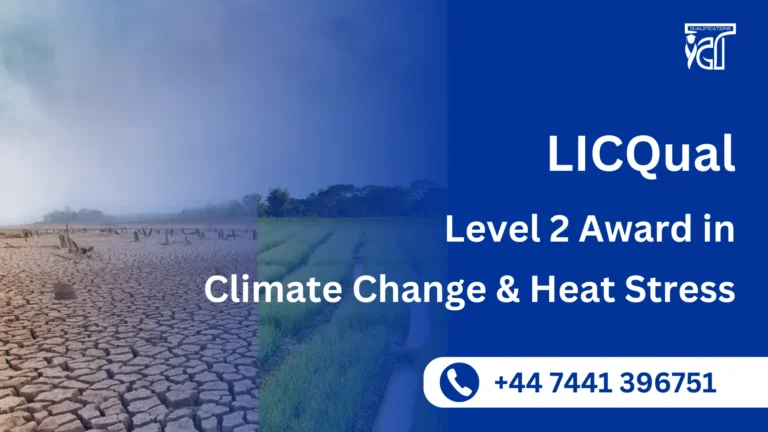The LICQual Level 4 Diploma in Environmental Sustainability Management is an internationally recognized, assignment-based qualification designed for learners who want to build advanced skills and knowledge in sustainability practices and environmental management. This program is ideal for professionals, supervisors, and aspiring managers who are committed to promoting sustainable development, addressing environmental challenges, and contributing to global sustainability goals.
The course provides a deeper understanding of sustainability management compared to Level 3, focusing on advanced concepts such as environmental legislation and governance, sustainable resource management, environmental impact assessment, climate change strategies, corporate social responsibility, and green technology innovation. Learners will explore how to develop and implement effective environmental management strategies that align with both organizational objectives and international sustainability standards.
One of the key strengths of this diploma is its flexible, assignment-based assessment method, which allows learners to apply theoretical knowledge to real workplace scenarios without the pressure of exams. This makes it particularly valuable for working professionals who need to balance their studies with career responsibilities.
By completing the LICQual Level 4 Diploma in Environmental Sustainability Management, learners gain practical skills that can be applied across industries such as construction, energy, manufacturing, corporate governance, and environmental services. The qualification not only enhances employability but also demonstrates a strong commitment to environmental responsibility—an increasingly essential attribute in today’s competitive job market.
Graduates of this course will be equipped to take on leadership roles, influence sustainable decision-making, and support organizations in achieving compliance, efficiency, and long-term sustainability. It also serves as a progression pathway to higher-level qualifications in environmental and sustainability management.
LICQual Level 4 Diploma in Environmental Sustainability Management
The Study Units of LLICQual Level 4 Diploma in Environmental Sustainability Management are as :
| Unit Ref# | Unit Title | G-L-H | GLH |
| LICQ2200019-1 | Principles of Environmental Sustainability | 10 | 50 |
| LICQ2200019-2 | Environmental Policy and Regulation | 10 | 50 |
| LICQ2200019-3 | Sustainable Resource Management | 10 | 50 |
| LICQ2200019-4 | Climate Change Mitigation and Adaptation | 10 | 50 |
| LICQ2200019-5 | Biodiversity Conservation | 10 | 50 |
| LICQ2200019-6 | Environmental Impact Assessment | 10 | 50 |
GLH (Guided Learning Hours) and TQT (Total Qualification Time) are terms commonly used in vocational qualifications to help define the amount of time a learner is expected to spend on their studies.
1. GLH (Guided Learning Hours)
GLH refers to the number of hours a learner spends being directly taught, supervised, or supported during their course. This includes the time spent in activities such as:
- Classroom instruction
- Practical workshops
- One-on-one tutoring or mentoring sessions
- Online learning sessions with tutor support
In other words, GLH represents the time that learners are actively engaged with their instructors or learning activities.
2. TQT (Total Qualification Time)
TQT represents the total amount of time a learner is expected to invest in completing a qualification, including:
- GLH (Guided Learning Hours): Time spent on direct learning, as explained above.
- Self-Directed Learning: This includes time spent on independent study, research, assignment completion, preparation for exams, and any other work the learner does outside of direct teaching hours.
TQT is a broader measure that includes all the time required to achieve the qualification. It helps learners and employers understand the overall commitment required for the qualification.
Key Differences Between GLH and TQT:
- GLH focuses on direct learning with guidance or supervision.
- TQT includes GLH as well as independent study time and other learning-related activities.
Example:
If a qualification has a TQT of 600 hours and a GLH of 250 hours, it means the learner should spend 250 hours in direct learning (classroom, online, or tutor-led sessions) and 350 hours on independent study or research.
Principles of Environmental Sustainability
Understand the fundamental principles and concepts of environmental sustainability.
Recognize the importance of sustainability in addressing global environmental challenges.
Explore how sustainable practices contribute to economic, social, and ecological balance.
Appreciate the role of individuals and organizations in promoting sustainable development.
Environmental Policy and Regulation
Understand the key environmental policies, laws, and regulatory frameworks at national and international levels.
Analyze the role of environmental regulation in promoting compliance and sustainable practices.
Apply legal and policy requirements to organizational sustainability initiatives.
Evaluate the effectiveness of governance structures in achieving environmental objectives.
Sustainable Resource Management
Understand the strategies for efficient use of natural resources including energy, water, and raw materials.
Apply sustainable methods to reduce waste, improve efficiency, and lower environmental impact.
Explore approaches to resource optimization that align with global sustainability goals.
Appreciate the importance of responsible consumption in organizational and community contexts.
Climate Change Mitigation and Adaptation
Understand the causes, consequences, and scientific basis of climate change.
Apply strategies for reducing greenhouse gas emissions and promoting renewable energy.
Develop adaptation frameworks to minimize risks and enhance resilience to climate impacts.
Assess the effectiveness of climate action initiatives against international sustainability targets.
Biodiversity Conservation
Understand the importance of biodiversity in maintaining ecological balance and sustainability.
Explore strategies for conserving ecosystems, habitats, and species at risk.
Apply biodiversity management practices within organizational and community settings.
Evaluate conservation initiatives and their role in supporting long-term environmental sustainability.
Environmental Impact Assessment
Understand the purpose, scope, and global relevance of Environmental Impact Assessments.
Conduct structured assessments to identify environmental risks and impacts of projects.
Develop and propose mitigation strategies that minimize adverse environmental effects.
Critically analyze and evaluate EIA reports to support sustainable decision-making.
The LICQual Level 4 Diploma in Environmental Sustainability Management is built to provide learners with advanced knowledge and professional skills to address global environmental challenges. This qualification goes beyond the fundamentals, preparing learners to take on leadership roles, implement effective sustainability strategies, and contribute to organizational and community-based environmental initiatives. The course is structured to deliver benefits that support both professional development and global sustainability goals.
Built for Advanced Knowledge
The course is built to enhance understanding of complex sustainability concepts including biodiversity conservation, environmental regulation, sustainable resource management, and climate change adaptation. Learners gain expertise that can be applied across diverse industries and international contexts.
Built for Career Progression
This diploma is built to support learners aiming for supervisory, managerial, or specialist roles in sustainability and environmental management. Employers increasingly value professionals with advanced sustainability skills, making this qualification a strong asset for career growth.
Built for Practical Application
The program is built on assignment-based assessments, enabling learners to apply knowledge directly to workplace scenarios. This practical approach develops critical problem-solving and decision-making skills essential for managing real-world environmental challenges.
Built for Global Relevance
This qualification is built in line with international sustainability standards, ensuring that learners can apply their skills across global industries. From corporate governance to environmental services, graduates are equipped to contribute to international sustainability goals.
Built for Organizational Impact
The course is built to help learners drive positive change within their organizations. By applying sustainable practices, graduates can reduce environmental risks, improve compliance, and enhance efficiency, ultimately contributing to long-term organizational success.
Built for Academic Progression
This diploma is built as a pathway to higher-level qualifications in sustainability and environmental management. It provides the foundation for further study, professional certifications, and continuous career development in the field of environmental sustainability.
The LICQual Level 4 Diploma in Environmental Sustainability Management is designed for learners who are ready to advance their expertise in sustainability and environmental leadership. This qualification is suitable for individuals aiming to contribute meaningfully to global sustainability initiatives while building strong career prospects in diverse sectors.
Built for Aspiring Environmental Leaders
This course is built for individuals who want to step into leadership roles within sustainability, environmental compliance, and resource management. It equips learners with the advanced skills needed to design and implement strategies that promote environmental responsibility.
Built for Industry Practitioners
The diploma is built for professionals already working in industries such as energy, construction, manufacturing, agriculture, or corporate governance who wish to strengthen their knowledge of sustainable practices and environmental management systems.
Built for Managers and Supervisors
This qualification is built for managers, team leaders, and supervisors who oversee operations with environmental impact. It helps them develop the competencies required to integrate sustainability into organizational policies and practices.
Built for Career Advancers
The program is built for individuals seeking to enhance their qualifications and progress into higher-level roles in sustainability and environmental management. It provides recognition and credibility for those aiming to stand out in competitive job markets.
Built for Lifelong Learners
This course is built for learners who are passionate about sustainability and committed to lifelong learning. It offers a platform to expand knowledge, engage with global issues, and actively participate in creating a more sustainable future.
Entry Requirements
Register Now
Qualification Process
LICQual Level 4 Diploma in Environmental Sustainability Management
- Self-Assessment:
Begin by evaluating your eligibility to ensure you meet the qualification requirements, including work experience, knowledge, and language proficiency. - Registration:
Complete your registration by submitting the required documents, including a scanned copy of a valid ID, and paying the registration fee. - Induction:
An assessor will conduct an induction to confirm your eligibility for the course and explain the evidence requirements. If you do not meet the criteria, your registration will be canceled, and the fee will be refunded. - Assignmnets & Evidence Submission:
Provide all assignmnets and the necessary evidence based on the assessment criteria outlined in the course. If you are unsure of the required evidence, consult with the assessor for guidance on the type and nature of evidence needed. - Feedback and Revision:
The assessor will review your submitted evidence and provide feedback. Evidence that meets the criteria will be marked as “Criteria Met,” while any gaps will be identified. You will be asked to revise and resubmit if needed. - Competence Evidence:
Submit final evidence demonstrating that all learning outcomes have been met. This evidence will be marked as “Criteria Met” by the assessor once it is satisfactory. - Internal Quality Assurance (IQA):
The Internal Quality Assurance Verifier (IQA) will review your evidence to ensure consistency, quality, and compliance with standards. - External Verification:
The IQA will submit your portfolio to LICQual External Quality Assurance Verifiers (EQA) for final confirmation. The EQA may contact you directly to verify the authenticity of your evidence. - Certification:
Upon successful completion of all checks, LICQual will issue your official certificate, confirming that you have attained the LICQual Level 4 Diploma in Environmental Sustainability Management

